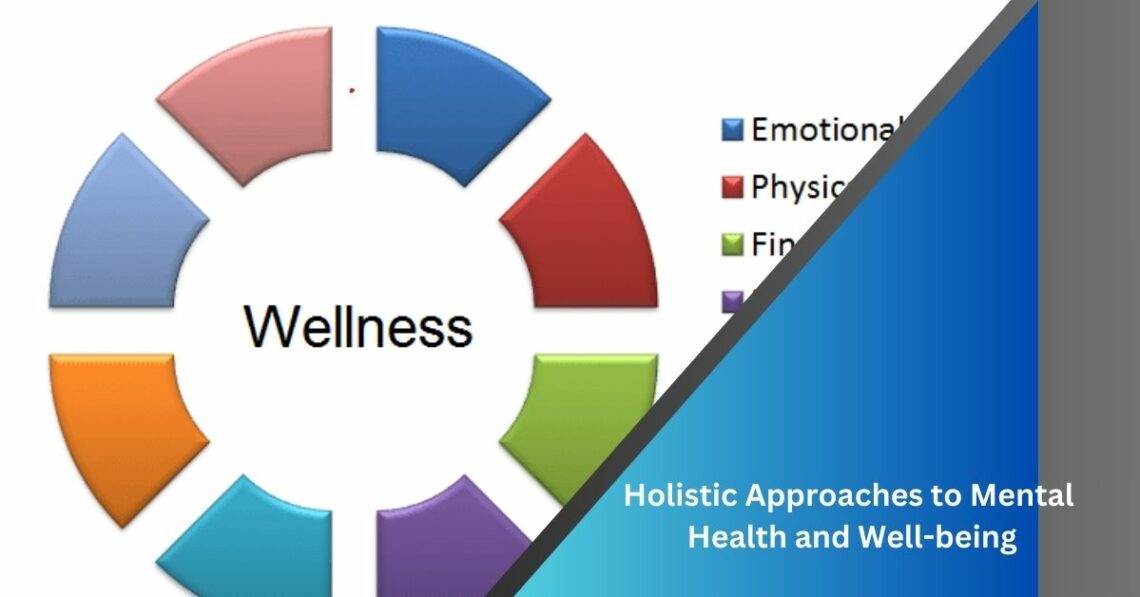
Holistic Approaches to Mental Health and Well-being
In today’s fast-paced world, the importance of mental health and well-being cannot be overstated. As individuals strive to find balance in their lives, holistic approaches offer a comprehensive and integrative way to address mental health issues.
This article explores the diverse facets of holistic approaches to mental health and well-being, providing insights into physical, emotional, social, and environmental factors that contribute to overall wellness.
Table of Contents
ToggleI. Introduction
A. Definition of Holistic Approaches
Holistic approaches involve considering the whole person—mind, body, and spirit—in the quest for optimal health and wellness. This inclusive perspective recognizes the interconnectedness of various aspects of an individual’s life.
B. Significance of Mental Health and Well-being
Mental health is a vital component of overall well-being, influencing how we think, feel, and act. Holistic approaches prioritize mental health by addressing not only the symptoms but also the root causes of mental health challenges.
II. Physical Well-being
A. Importance of Exercise
Physical activity is a cornerstone of holistic mental health. Regular exercise has been linked to improved mood, reduced stress, and enhanced cognitive function. Exploring various forms of physical activity can be key to finding an enjoyable and sustainable routine.
B. Nutritional Practices for Mental Health
Nutrition plays a crucial role in mental health. Incorporating a balanced diet rich in essential nutrients can positively impact mood and cognitive function. This section explores dietary practices that support mental well-being.
III. Emotional Well-being
A. Stress Management Techniques
Stress is an inevitable part of life, but managing it effectively is essential for mental health. Holistic approaches include diverse stress management techniques such as deep breathing, progressive muscle relaxation, and mindfulness.
B. Building Emotional Resilience
Developing emotional resilience is crucial in navigating life’s challenges. This section delves into strategies for building emotional resilience, fostering the ability to adapt and bounce back from adversity.
IV. Social Well-being
A. Impact of Relationships on Mental Health
Healthy relationships contribute significantly to mental well-being. This section explores the impact of social connections on mental health and provides insights into fostering positive relationships.
B. Community Engagement
Engaging with communities and social groups is an integral part of holistic well-being. Being part of a supportive community can provide a sense of belonging and purpose, positively affecting mental health.
V. Mind-Body Connection
A. Practices like Yoga and Meditation
The mind-body connection is a central tenet of holistic approaches. Practices like yoga and meditation not only enhance physical flexibility but also promote mental clarity, stress reduction, and overall well-being.
B. Benefits of Mindfulness
Mindfulness, the practice of being present in the moment without judgment, has gained popularity for its positive effects on mental health. This section explores the benefits of incorporating mindfulness into daily life.
VI. Environmental Factors
A. Influence of Surroundings on Mental Well-being
The environment we live in can significantly impact mental health. This section examines how factors such as natural settings, light, and decluttered spaces contribute to a positive mental state.
B. Creating a Healthy Living Space
Practical tips for creating a healthy living space are discussed, emphasizing the importance of a supportive and nurturing environment for mental well-being.
VII. Integrative Therapies
A. Holistic Therapies Overview
Holistic therapies encompass a range of approaches, including acupuncture, chiropractic care, and naturopathy. This section provides an overview of these complementary therapies and their potential benefits.
B. Complementary Approaches
Exploring the synergy between conventional and alternative medicine, this section discusses how complementary approaches can offer a holistic perspective on mental health.
VIII. Personal Growth and Development
A. Lifelong Learning and Mental Health
Continuous learning and personal development contribute to mental well-being. This section explores the connection between ongoing education, personal growth, and holistic mental health.
B. Setting and Achieving Personal Goals
The process of setting and achieving personal goals is examined as a means of fostering a sense of purpose and accomplishment, positively influencing mental health.
IX. Holistic Healthcare
A. Integrating Traditional and Alternative Medicine
Holistic healthcare integrates conventional medical practices with alternative therapies. This section explores how this integrative approach can address mental health challenges comprehensively.
B. Holistic Health Practices
An overview of holistic health practices is provided, emphasizing the importance of preventive care and addressing the root causes of mental health issues.
X. Challenges and Misconceptions
A. Common Misunderstandings
Addressing common misconceptions surrounding holistic approaches, this section aims to provide clarity on the principles and effectiveness of holistic mental health practices.
B. Addressing Challenges in Holistic Approaches
Challenges in adopting holistic approaches are discussed, along with practical strategies for overcoming obstacles on the journey to holistic well-being.
XI. Success Stories
A. Real-life Experiences
Sharing real-life success stories highlights the positive impact of holistic approaches on individuals’ mental health journeys, inspiring others to explore these avenues.
B. Impact of Holistic Approaches on Individuals
Examining the transformative effects of holistic approaches, this section illustrates the profound changes individuals can experience in their mental health and overall well-being.
XII. Future Trends
A. Evolving Landscape of Holistic Mental Health
As the understanding of mental health evolves, so do holistic approaches. This section explores emerging trends and innovations shaping the future of holistic mental health.
B. Emerging Innovations
Cutting-edge innovations in holistic mental health are discussed, providing a glimpse into the exciting possibilities that lie ahead in this dynamic field.
XIII. Tips for Incorporating Holistic Approaches
A. Practical Advice for Daily Life
Practical tips are offered for seamlessly integrating holistic approaches into daily life, promoting sustainable changes that positively impact mental health.
B. Making Sustainable Changes
Emphasizing the importance of sustainability, this section provides guidance on making lasting changes that contribute to long-term mental well-being.
XIV. Holistic Approaches for Specific Demographics
A. Children and Adolescents
Tailoring holistic approaches to the unique needs of children and adolescents is explored, recognizing the importance of early intervention for lifelong well-being.
B. Holistic Practices for Older Adults
Adapting holistic practices to cater to the specific challenges and opportunities faced by older adults is discussed, promoting mental well-being in the later stages of life.
XV. Conclusion
A. Recap of Key Points
Summarizing the key points discussed throughout the article reinforces the holistic nature of mental health and well-being.
B. Encouragement for Holistic Well-being
Encouraging readers to explore holistic approaches to mental health, the conclusion emphasizes the transformative potential of embracing a comprehensive and integrative perspective on well-being.
FAQs
Are holistic approaches scientifically proven to improve mental health?
Holistic approaches have gained recognition in scientific research, with evidence supporting their positive impact on mental health.
Can I incorporate holistic practices alongside conventional mental health treatments?
Yes, many individuals complement conventional treatments with holistic practices, creating a well-rounded approach to mental health.
How long does it take to see results from holistic approaches?
Results vary, but consistent implementation of holistic practices often leads to gradual and sustainable improvements in mental well-being.
Do holistic approaches work for everyone?
Holistic approaches are diverse, and their effectiveness can vary from person to person. It’s essential to find what works best for individual needs.
Where can I find reliable information on holistic mental health practices?
Reputable sources, including healthcare professionals and well-established holistic health organizations, can provide reliable information on holistic mental health practices.
You May Also Like

Shift Select Upmc – Click To Unlock The Details!
February 17, 2024
Unscramble Words – A Comprehensive Guide In 2024!
March 5, 2024

